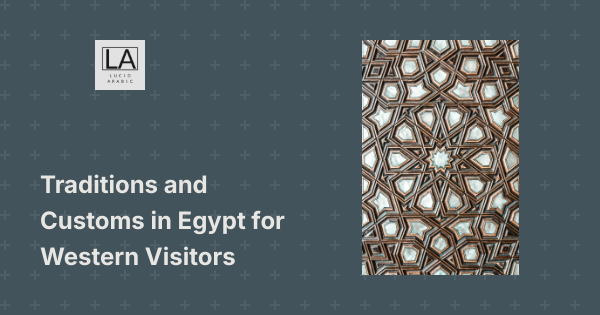Egypt is a country rich in history, tradition, and deep-rooted customs that reflect its unique blend of Middle Eastern, African, and Mediterranean influences. For a visitor from the West, understanding and respecting these cultural nuances can greatly enhance the experience of traveling in Egypt. This article provides a guide to Egyptian traditions, social customs, and etiquette to help Western visitors integrate smoothly and enjoy a more immersive and respectful visit.
Hospitality and Social Etiquette
Hospitality is a cornerstone of Egyptian culture. Visitors are often treated with warmth and generosity, as hosting guests is considered an honor. When visiting an Egyptian home, it is customary to bring a small gift, such as sweets or flowers, as a token of appreciation. Refusing food or drink may be seen as impolite, so even a small taste is appreciated.
Handshakes are the most common form of greeting, though some Egyptians, particularly women, may prefer not to shake hands with the opposite gender due to religious reasons. A simple nod or verbal greeting suffices in such cases. It is polite to use titles such as “Mr.” or “Mrs.” followed by the person’s surname until invited to use their first name.
Dress Code and Modesty
Egyptians generally dress conservatively, especially in rural areas and religious sites. While major cities like Cairo and Alexandria are more lenient, it is advisable for visitors to dress modestly. For women, covering shoulders and knees is recommended, and carrying a scarf can be useful for visiting mosques. Men should avoid wearing sleeveless shirts and shorts in conservative settings.
Beachwear is acceptable at resorts along the Red Sea, but in public areas, modest attire is preferred. Following local dress norms not only shows respect but also helps travelers avoid unwanted attention.
Religious Customs and Sensitivities
Islam is the predominant religion in Egypt, and its influence is evident in daily life. Calls to prayer (adhan) can be heard five times a day, and it is customary for many businesses to slow down or close during prayer times. Visitors should be mindful of religious observances and avoid loud behavior near mosques.
During the holy month of Ramadan, Muslims fast from sunrise to sunset. Eating, drinking, or smoking in public during daylight hours is considered disrespectful. If visiting during Ramadan, it is advisable to eat discreetly or in designated areas for non-fasting individuals.
Dining Etiquette and Food Culture
Egyptian cuisine is flavorful and diverse, with dishes like koshari, ful medames, and molokhia being local favorites. Eating with the right hand is customary, as the left hand is traditionally associated with hygiene. In some settings, food may be shared from a communal plate, and it is polite to take only what you can eat.
When dining at a restaurant, tipping (baksheesh) is expected. A 10-15% tip is customary, even if a service charge is included in the bill. Tipping also extends to taxi drivers, hotel staff, and tour guides as a sign of appreciation for their service.
Public Behavior and Communication
Egyptians are generally friendly and enjoy engaging in conversation. However, public displays of affection between couples are frowned upon, especially in rural areas. It is best to keep interactions reserved in public spaces.
Negotiation and bargaining are a common part of shopping in traditional markets (souks). Vendors expect customers to haggle, and it is considered a normal and even enjoyable practice. However, bargaining should be done respectfully and with a friendly attitude.
Transportation and Interaction with Locals
Cairo, in particular, has heavy traffic and a fast-paced driving culture. Taxis, ride-hailing apps, and public transportation are common means of getting around. When using taxis, agreeing on a fare beforehand is recommended to avoid disputes.
While most Egyptians are hospitable and eager to help foreigners, female travelers should be cautious when interacting with strangers, as unwanted attention can sometimes occur. Traveling in groups or with a local guide can enhance safety and comfort.
Respect for Ancient Sites and Cultural Heritage
Egypt is home to some of the world’s most treasured historical sites, including the Pyramids of Giza, Luxor’s Karnak Temple, and Abu Simbel. Visitors should avoid touching ancient structures, as preservation efforts are crucial. Photography rules vary at different sites, so it is best to check before taking pictures.
Additionally, while engaging with local vendors and guides near historical sites, a polite but firm approach can help manage persistent sales tactics.
Final Thoughts
Visiting Egypt is a rewarding experience filled with rich history, stunning landscapes, and warm hospitality. By understanding and respecting local customs, Western visitors can foster positive interactions and create meaningful connections with Egyptians. A willingness to adapt, an open mind, and a respectful attitude will go a long way in ensuring a smooth and enjoyable journey in this fascinating country.

